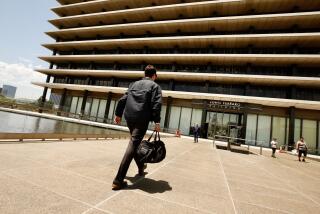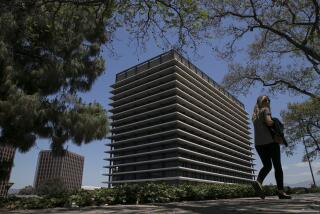Editorial: What happened to DWP reform? Garcetti is silent this time on union pay raises and contract
- Share via
What a difference four years makes.
In the summer of 2013, newly elected Mayor Eric Garcetti faced the first significant test of his leadership skills. He had won the election despite the fact that the union representing Los Angeles Department of Water and Power employees had poured $2 million into the campaign of his opponent. Garcetti had used that to his advantage in the campaign, positioning himself as the independent candidate who could stand up to the powerful DWP union leader Brian D’Arcy and demand reform for ratepayers.
Within weeks of his inauguration, Garcetti was presented with a new contract for the International Brotherhood of Electrical Workers Local 18, which represents most DWP employees. The deal on the table was unusually spare by city union standards. It called for three years without raises, followed by a 4% pay hike in 2016. It also significantly reduced pension benefits for new employees.
Still, Garcetti had pledged to be a check on the IBEW and he refused to sign off on the contract until it lowered healthcare costs and addressed the utility’s “costly and secret work rules.” In the end, he didn’t get everything he wanted, but he got some, including giving DWP management the right to reopen the contract to negotiate labor rules.
The contract is being fast-tracked with a final City Council vote scheduled for Wednesday.
Here we are four years later. Garcetti will soon be sworn into his second term and there’s a new IBEW contract on the table. This time the deal is considerably more generous, calling for six raises over five years, totaling between 13.2% and 22.3%, depending on how much inflation goes up. There’s no additional pension reform and there’s still no requirement that employees contribute to their healthcare premiums. The deal does eliminate $4 million a year spent on secretive union-run training and safety institutes. But those secretive work rules that the mayor complained about? The utility has only just begun a study on them.
This time, however, Garcetti hasn’t said a word. The deal was put on the agenda of the Board of Water and Power Commissioners, who are appointed by the mayor, and approved Tuesday with less than 24 hours notice. The contract is being fast-tracked with a final City Council vote scheduled for Wednesday. No meetings with neighborhood council members. No petitions calling for additional cost savings. Instead, Garcetti and City Hall have fallen back into a familiar pattern in which employee pay and benefits are negotiated behind closed doors and then quickly approved with little transparency or discussion of the long-term budget implications.
Public employee unions are major donors to City Hall political campaigns, so perhaps it should be no surprise if elected officials are reluctant to drive a hard bargain. But this contract could sure use more analysis and public debate. In fact, the scrutiny and public debate over the DWP during the 2013 mayoral race helped the city negotiate a more cost-effective deal for ratepayers.
Garcetti’s aides argue that the IBEW contract is reasonable when compared with those at other utilities in the region and that its pay hikes and other favorable terms are necessary to address the very real competition for skilled workers. The deal, for example, would give DWP linemen an additional 4% pay hike over two years and entitle them to double-time when they work extra hours in order to help stem the exit of linemen who get their training through the DWP and then leave for bonuses and higher pay at private utilities. Higher pay for such in-demand workers makes sense.
But here’s a problem: Other city employee unions have typically demanded comparable raises with DWP workers, even though many of those employees are not specialized utility workers but rather custodians, secretaries and security guards who already get higher compensation than workers in similar jobs in the public and private sector. In 2007, then-Mayor Antonio Villaraigosa approved raises of nearly 25% over five years for some 20,000 city workers to appease complaints about the pay disparity with DWP employees. That deal proved extraordinarily expensive, especially as the recession hit, and the city ended up laying off workers, offering early retirement and slashing services to cut costs.
Garcetti’s aides say the mayor will not repeat the mistakes of the past and that the DWP deal is not a template for upcoming negotiations with other city employee unions. But Garcetti also said he wants all employees to cover 10% of the cost of their healthcare premiums — yet recent contracts, including those covering both DWP workers and the coalition of civilian unions, did not require workers to pay more of those costs.
Contract negotiations are exactly that — negotiations. There’s always a tension between controlling the city’s growing labor expenses and doing what’s necessary to retain talent. But the ratepayers and the taxpayers need to know they’ve got elected leaders looking out for their interests at the negotiating table. In 2013, Garcetti demonstrated that he was trying. In 2017? Who knows?
Follow the Opinion section on Twitter @latimesopinion and Facebook
More to Read
A cure for the common opinion
Get thought-provoking perspectives with our weekly newsletter.
You may occasionally receive promotional content from the Los Angeles Times.










